If you are a busy person with persistent headaches and do not have time to visit the doctor from your tough schedule, there is good news. Thanks to advanced technology, conversational AI in healthcare has been introduced to make your life easier. It provides a convenient solution to getting the healthcare you need without disrupting your routine. Thus, follow this guide and learn about conversational AI’s use cases and benefits.
What is Conversational AI for Healthcare?
Conversational AI for healthcare uses artificial intelligence systems, which are designed to communicate with patients and healthcare providers. These systems include chatbots and voice-based AI tools that can understand and respond to queries in real time. Moreover, with advanced technologies like natural language processes and machine learning, this AI can simulate human-like interactions.
Besides, it provides instant support, assists in scheduling appointments, and even guides patients through symptoms. Moreover, conversational AI is available 24/7 for patient support, ensuring they get medical advice anytime, even in remote areas. Additionally, it reduces the duty load on healthcare providers and manages repetitive tasks such as follow-ups and data collection.
10 Use Cases of Conversational AI in Healthcare
If you want to understand how healthcare conversational AI can assist you, you are in the right place. Let’s explore some of the use cases and how they can enhance your healthcare experience:
1. Answer queries
One of the use cases is that the advanced technology answers patients’ queries in real-time. They often have questions about symptoms and medication, but waiting for a doctor’s availability can be unnecessary. Therefore, conversational AI technology in healthcare provides instant, accurate responses to common health-related questions.
For example, an AI assistant can guide patients on how to manage a fever and provide information about the side effects. Moreover, it ensures you get answers 24/7, which is especially helpful during off hours or in areas with limited healthcare resources.
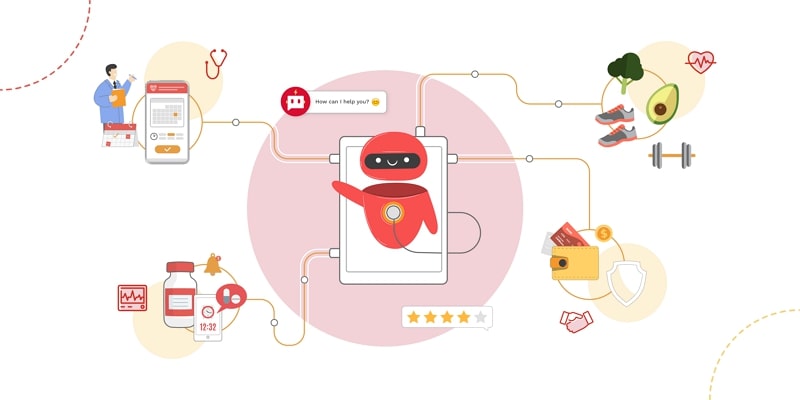
2. Symptom Checking
When you’re facing symptoms but don’t know if you need immediate medical attention, this technology can help in this regard. Conversational AI in healthcare can ask you some questions about your symptoms, medical history, and other factors. Moreover, based on this information, the system can provide recommendations, including self-care tips, scheduling a doctor’s visit, and seeking emergency care.
Such as, if you are feeling chest pain, the AI might suggest you contact emergency services immediately. This use case is valuable because it offers patients peace of mind while reducing unnecessary visits to clinics. In addition, symptom checkers can prioritize certain users, helping healthcare providers focus on patients who need urgent care.
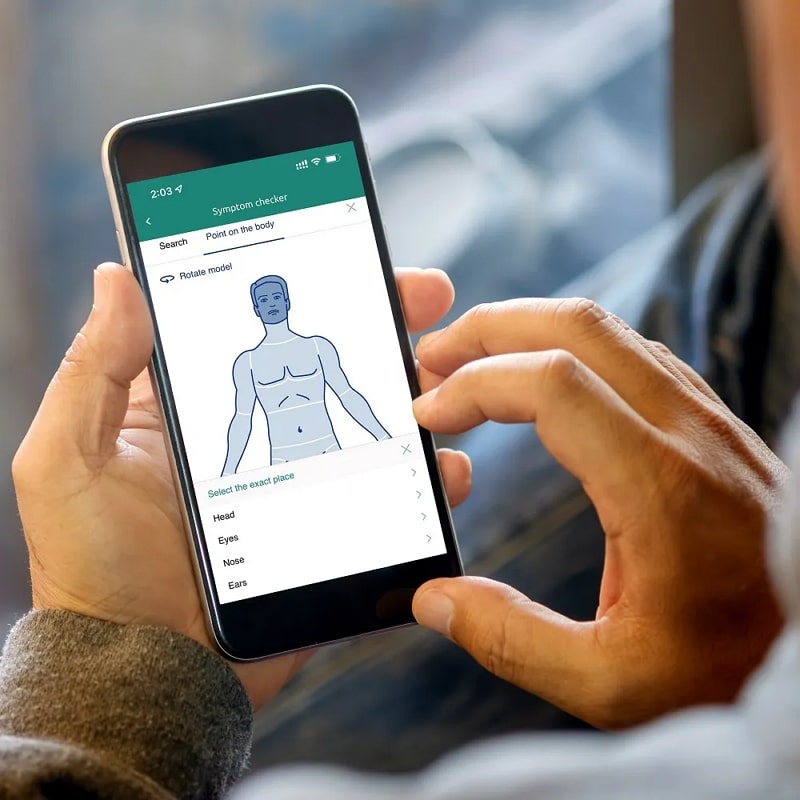
3. Appointment Scheduling
While scheduling an appointment, you might need to wait for phone calls or go through complicated booking systems, which can cause frustration. However, with conversational AI for healthcare, you can book, reschedule, or cancel appointments directly through virtual assistants. For example, one can simply type or say, “I need to see a dermatologist next week,” and the AI system will find available slots, confirm the booking, and send reminders.
In addition, this process reduces the staff’s workload, minimizes schedule problems, and ensures a smoother process for everyone. Moreover, you can personalize the system, and it will remember your preferences, such as your preferred doctor or appointment times. By offering a user-friendly solution, AI enhances the overall patient experience.

4. Medical Training
This is another powerful case of healthcare conversational AI that can help you assess the urgency of your condition and direct you to the appropriate level of care. Besides, the system can ask you structured questions about your symptoms and current health concerns. Then, based on your answers, the AI will conclude whether you need immediate emergency care or a consultant with a specialist.
For example, if you report shortness of breath, the AI will analyze your symptoms and recommend you see the doctor if it’s serious. Furthermore, this approach is particularly useful in busy healthcare settings where it helps you ensure that you need immediate care or not.

5. Health & Medication Management
You can get overwhelmed when you have to manage multiple medications and keep track of your dosage. This is why conversational AI technology in healthcare can help you provide personalized reminders and instructions about medication. Moreover, it can ensure that you take the correct dosage at the right time. Additionally, AI allows you to check side effects and receive alerts if any medications trigger allergies.
This use case helps you stick with your treatment plans and lower the chance of medication mistakes. You will not miss your medicine and stay on top of your health by getting clear instructions and timely reminders. This also leads to better outcomes and fewer complications, which ultimately supports long-term health management.
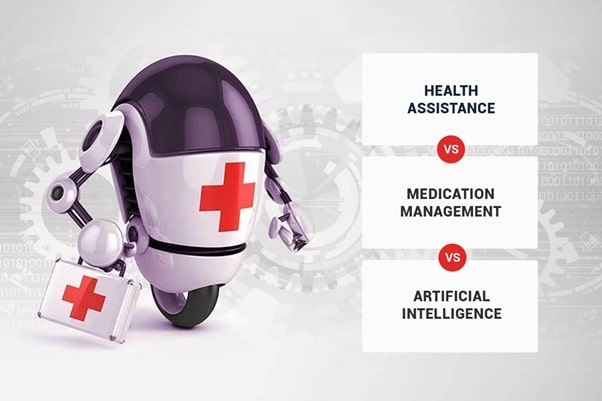
6. Mental Health Support and Counseling
When someone is sick, they can struggle with mental health and may hesitate to seek professional health. Conversational AI in healthcare can provide support and confidential space for individuals to express their feelings, share their concerns, and access coping strategies. AI virtual assistants can guide users through relaxation techniques, mindful exercise, or some other therapy practices.
Furthermore, these techniques can help manage anxiety, stress, or depression, which can be common symptoms an ill person can face. The AI is particularly available to give you 24/7 support and ensures you can access help whenever you need it. In addition, this technology can track your emotional well-being and suggest when professional therapy may be helpful.

7. Patient Engagement and Post-Treatment Care
After a patient receives treatment, especially surgery, ongoing support is essential to ensure recovery and manage any potential side effects. Conversational AI for healthcare can maintain patient engagement by sending follow-up reminders about the instructions for post-treatment care. Moreover, AI can help patients through physical therapy exercises and warn them of their condition that may need further attention.
This constant support helps keep the patients motivated and informed about the improvement of their overall treatment. Besides, it reduces the need for frequent checkups and the reassurance they need. By keeping patients actively involved in their recovery, AI enhances the chances of successful recovery and reduces complications after treatment.
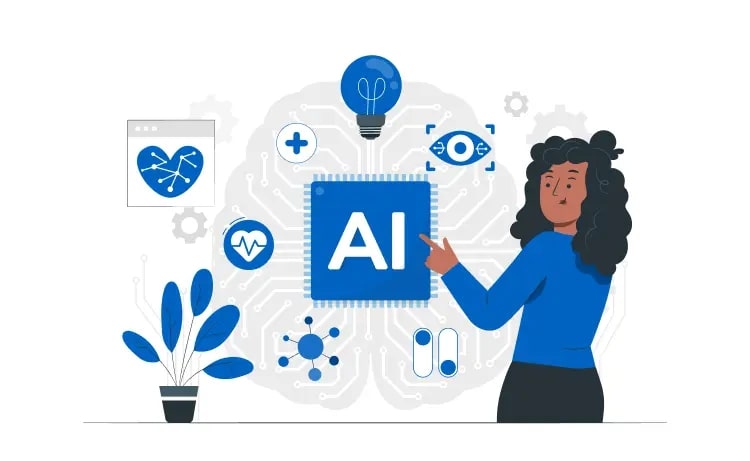
8. Patient Insights
Through continuous patient interaction, healthcare conversational AI can gather detailed information about patient health status, treatment progress, and lifestyle habits. When AI tracks that data, it can identify potential concerns and give the healthcare provider deeper insights into patients’ conditions. Moreover, those insights may not be immediately apparent through traditional checkups.

9. Revenue Cycle Management
Conversational AI technology in healthcare plays a vital role in making healthcare’s revenue schedule (RCM) simpler and more efficient. For instance, tasks like explaining medical bills to patients, checking what insurance covers, and helping set up payment plans. This makes it easier for parents to understand their costs and pay on time, which reduces confusion and delays.
Additionally, for healthcare providers, AI manages time-consuming jobs such as verifying insurance, submitting claims, and following up on unpaid bills. Besides, it avoids manual errors, speeds up payments, and helps eliminate claim rejection. By streaming this process, conversational AI ensures that both patients and healthcare providers save time and manage finances more smoothly.
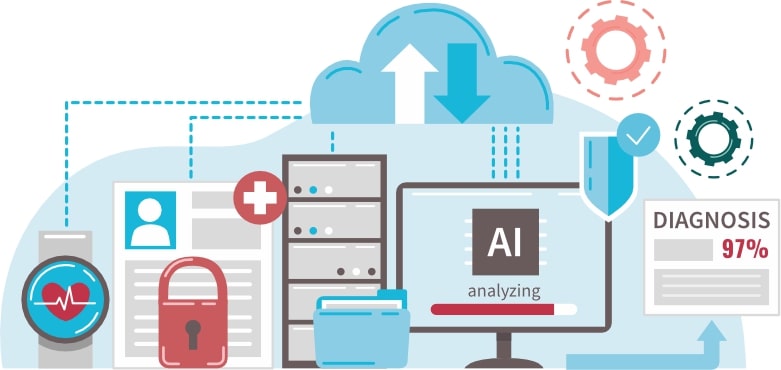
10. Language Translation in Healthcare
Language translation in healthcare conversational AI helps reduce the communication gap between patients and providers who speak different languages. Many patients face problems when they express their symptoms, understand medical instructions, or navigate healthcare services due to language barrier. Therefore, AI tools with real-time translation capabilities can interpret conversion, documents, and instructions into patients’ preferred language.
This technology is especially helpful in diverse communities and for international patients who want to avoid the language barrier. Additionally, it allows patients to feel heard and understood while healthcare providers can offer accurate diagnoses and treatment without misunderstanding. Conversational AI also ensures everyone gets the care and information they need, even with language differences.
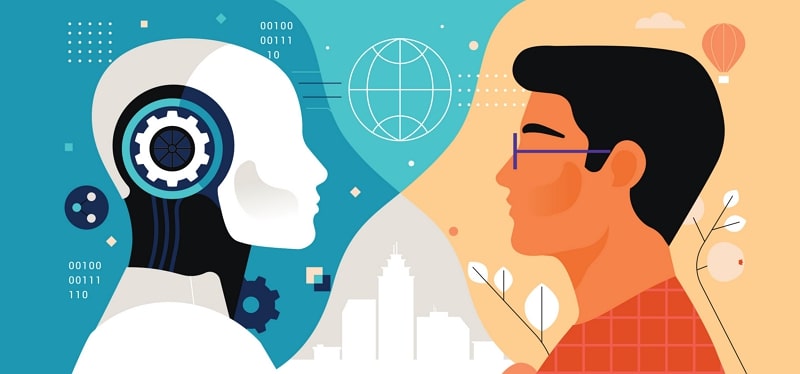
Benefits of Implementing Conversational AI in Healthcare Services
Now that you understand the use cases of conversational AI for healthcare and how it can help you. There is an unlimited list of advantages you can get using this, some of which are given below:
- Streamlined Workflow for Healthcare Providers: With the help of AI, doctors can streamline their workflow and routine tasks like appointments and patient inquiries. Moreover, this allows healthcare admins to focus more on cognitive tasks rather than repetitive administrative work.
- Enhanced Patient Engagement: This advanced technology can engage patients through personalized communication and provide them with relevant health information. This leads to better information and encourages active participation in their healthcare journey.
- Increased Accessibility in Remote Areas: People living in remote areas or underserved areas can get help through conversational AI. Furthermore, with the help of virtual consultation and support, patients can receive care without the need to travel long distances.
- Proactive Health Management: AI can track patients’ data over time and offer timely suggestions to manage chronic conditions and prevent potential issues. Additionally, this proactive approach helps patients stay in better health.
- Real-Time Feedback Collection: Healthcare providers can use this technology to gather real-time feedback from patients after appointments or treatments. The immediate response can help them improve service quality and patient satisfaction.
Why Choose ZEGOCLOUD for Conversational AI in Healthcare Support?
For driving a revolutionary change in conversational AI technology in healthcare, ZEGOCLOUD offers you innovative conversational AI solutions. Using its AI agent API, you can develop an app for the healthcare sector to seamlessly respond to patients’ queries in 500ms without delays or lags. Additionally, with LLM and TTS models, the AI is enriched with emotional awareness to offer responses based on human emotions and feelings.
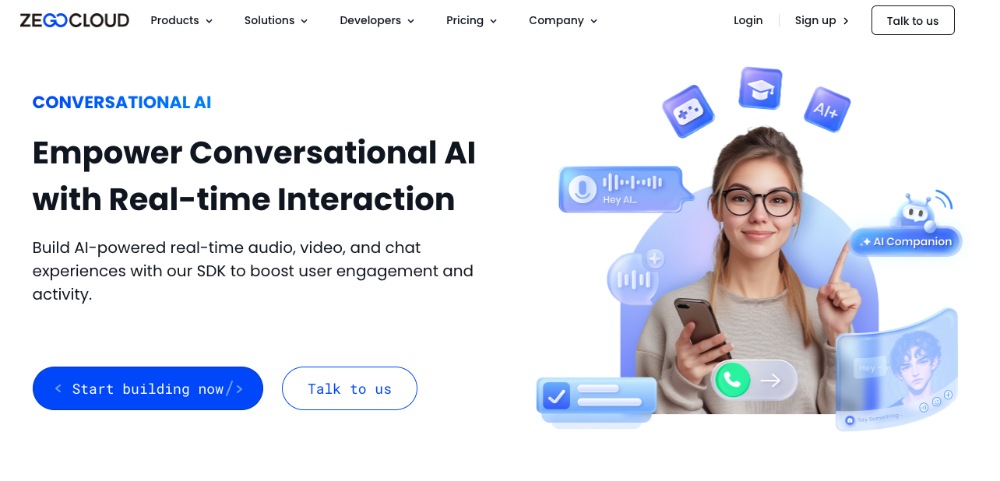
While using ASR vendors for speech recognition, you can provide multimode interaction features in web apps and tools. This means patients can interact with AI through in-app chat, voice calls, or voice interaction to share their problems. Furthermore, when communicating via voice calls, the AI and the user’s content are displayed on the screen. Then, it is synchronized to the in-app chat message list after the conversation ends.
The SDK will provide voice detection VAD and AI noise reduction features to ensure users get hindrance-free responses. It also lets you edit Q&A, and Al replies again while clearing the interaction. With the global coverage of 500+ nodes in 212 countries, you can guarantee that AI offers uninterrupted assistance globally. Considering the API’s AI agent library, you can personalize multiple agents if one AI isn’t meeting the needs.
Conclusion
In conclusion, advanced technology has introduced you to conversational AI in healthcare, which can help you in many ways. This guide has provided you with its top 10 use cases and advantages of conversational AI. Now, if you aim to integrate this technology into your healthcare web app or software, try ZEGOCLOUD APIs and SDKs to enjoy seamless interaction. Its AI agent API is the perfect solution to the needs of personalized healthcare services.
Read more:
FAQ
Q1: How is AI Used in Healthcare?
AI is used in healthcare for a variety of purposes, such as diagnosis assistance, predictive analytics, personalized treatment plans, and medical imaging analysis. It helps healthcare professionals make more accurate decisions and improves patient care efficiency.
Q2: How are AI Chatbots Used in Healthcare?
AI chatbots in healthcare are used to provide patients with 24/7 support, answer medical inquiries, schedule appointments, remind patients about medications, and even assess symptoms based on predefined algorithms. They help reduce waiting times and improve patient access to information.
Q3: Which of the Following is a Benefit of Conversational Artificial Intelligence in Healthcare?
A key benefit of conversational AI in healthcare is improved patient engagement. It provides patients with quick, easy access to information and support, enhancing their overall healthcare experience and reducing the burden on medical staff.
Let’s Build APP Together
Start building with real-time video, voice & chat SDK for apps today!










